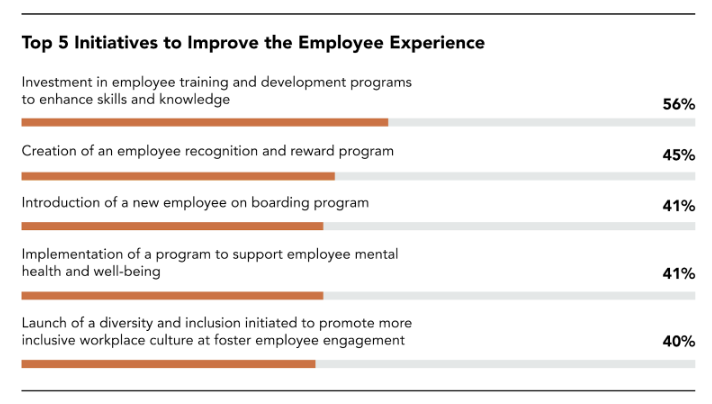Brandon Hall Group™ and Totara held a recent webinar to look at strategies for enabling the success of deskless workers through training, skill and competency validation, and ongoing performance management and enablement.
The deskless workforce refers to any segment of the team that does not have a fixed workstation/workspace. This spans every type of role from retail and food service to manufacturing to field-based technicians and clinical or laboratory environments. Learning and upskilling is critical to the overall employee experience and is often a key reason why many deskless workers leave within the first 12 months. Because of its importance to a positive employee experience, we know that organizations are investing in employee training and development as key focus for improvement.
The panel was moderated by Matt Pittman, Principal Analyst with Brandon Hall Group™, and included Tammy Frame, Ed.D., SVP of Customer Enablement with Totara; Susan Neumans Van Buren, Ph.D., Manager of Human Resources and Training with CHELCO; and Elton Machholz, Manager of Learning and Development with Charles River Laboratories.

Dr. Frame shared some meaningful statistics that illustrate the challenges deskless workers deal with. “83% of deskless workers are still doing a lot of paper and pencil processes. … 38% say that adequate training and upskilling is one of the top drivers of why they are unhappy and 29% tell us that they don’t have access to adequate training and upskilling.” Safety and injury prevention can also be unique considerations for deskless workers, especially in industries like construction, transportation, warehousing, agriculture, etc.
These statistics are borne out by the challenges experienced by both CHELCO and Charles River Laboratories in supporting their deskless workforce.
For CHELCO, a not-for-profit electric cooperative whose workforce is 51% deskless, they have strict and complex regulatory requirements, regularly deal with internet connectivity issues in the rural areas they serve, and there’s the need to really shift the mindset of the organization around how best to deliver training and support the mobile workforce.
Charles River Laboratories is a biomedical research facility. A large percentage of their staff is working in sterile environments and moving from room to room to perform various tasks. They are also subject to robust regulatory requirements beyond just training requirements. The company is required to be able to show, at a moment’s notice, not only that a staff member has been properly training but that they are accurately and correctly performing the skills in their day-to-day work.
Technology plays a crucial role in addressing the challenges faced by deskless workers, from providing just-in-time resources and documenting training to identifying training needs and
optimal delivery methods. Implementing a structured on-the-job training methodology and creating a resource library can help in the training and development of deskless workers.
Totara is uniquely positioned to support the needs of the deskless workers through a number of tools fully integrated into a powerful ecosystem — from observational checklists, achievement paths and career pathways, to flexible workflows and a central repository for important reference material every aspect of your deskless workflow needs.
Key Takeaways
The panel offered a number of important insights. Here are some of the key takeaways.
Takeaway 1: Personalized Learning is Key to Employee Satisfaction and Retention
The webinar emphasized the importance of personalized learning for employees, particularly in deskless roles. It was noted that many organizations have yet to fully implement personalized learning, which can contribute to high attrition rates among the deskless workforce. The panelists discussed the role of technology in enabling personalized learning and how it can be used to address the specific needs and preferences of deskless workers.
Dr. Frame highlighted the need for flexibility in learning platforms, stating that “Totora is the most flexible LMS on the market.” She mentioned that the platform offers tools that can be tailored to the needs of deskless workers, including observational checklists, flexible workflows, and data-driven dashboards. Van Buren, on the other hand, stressed the importance of having a structured on-the-job training methodology and providing resources for deskless workers to access just in time.
Machholz shared Charles River Laboratories’ approach to personalized learning, which involves a technical training program that considers the learner as the center of the process. He explained that the program uses different scales of assessment and a well-defined nomenclature for skills to track and certify the learning process of the deskless workers.
Takeaway 2: Overcoming Challenges in Delivering Learning to Deskless Workers
The webinar also discussed the challenges encountered in delivering learning to deskless workers. These include standardization and documentation of training, connectivity issues, the paradigm shift toward digital learning and the identification of learning gaps. Panelists shared their strategies in overcoming these challenges, focusing on technology’s role and the importance of leadership buy-in.
Van Buren shared how CHELCO used the Totora LMS to provide just-in-time resources and document training. She also emphasized the importance of conducting training task analyses for each position and training subject matter experts in adult learning and structured on-the-job training methods.
Machholtz discussed how Charles River Laboratories used the Totora Learn platform in their skill-certification process. He mentioned the value of having a simplified rubric in the system to review each of the competency criteria.
Takeaway 3: Ensuring Safety and Compliance for Deskless Workers
Safety and compliance were identified as critical considerations in training deskless workers, particularly in industries with high regulatory requirements. The panelists discussed how technology can support the documentation of safety training and ensure compliance with regulations.
Dr. Frame, citing data from the US Bureau of Labor Statistics, pointed out the high number of preventable fatal work injuries in industries with a large deskless workforce. She underscored the importance of having technology to support safety training, particularly for deskless workers.
Van Buren, for her part, highlighted how CHELCO uses the Totora platform for documenting safety training requirements and proficiency levels. Machholz also discussed Charles River Laboratories’ approach to meeting regulatory requirements, which involves linking skills to well-defined job descriptions and using the LMS platform for documenting skills certification.
The discussion concluded with a quick walkthrough by Dr. Frame of a process companies can use to establish a skills development strategy. It involves six basic steps — establishing the scales, setting up your skill and competency frameworks, uploading those competencies to the system, setting up achievement paths that enable individuals to gain mastery of the competencies and then assigning the competencies to the individuals.
You can view the replay of the entire session here.




